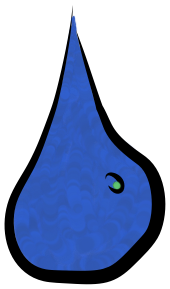I’ve been sitting on this material for a while. Many of my informants would recognize it as coming from back in 2006 when I was passing the PDFs around Vicarious Visions. Starting in 2008, the essay has been reviewed well and reviewed poorly and still not accepted. One interesting thing has been that despite good reviews it has even been rejected, told to go to something more “New Media” or “Game Studies.” So while I’ll continue to push its publication through, the empirical material is simply too interesting to keep closed off from view as I await further feedback. Thus, some excerpts from an as-of-yet unpublished manuscript, “Whither Mario Factory?” after the break.
So, as you can see I’m playing with water and fire a bit this summer. I’m not entirely happy with the way that the brush system worked out on the little water guy, but all in all not too bad. I’m not sure how well the transparency of the brush has worked, but I’ll get a sense of that in a bit as I start tiling the image on the screen. The next component of what I’ve done is create feet and animations of those feet and assembled them into PNG files which can then be animated on the screen. I’ll post these assembled PNG files next. Once I’ve done one set of animations, I’ll work on some other poses for each fo the water/fire characters.
Again, I used similar methods for this drawing, though the real experiment was in determining how to use the brush system of Pixelmator, which for a geek like me was probably more fun than it ought to have been.
I am assembling these together in a simple little iPhone/iPod Touch application while preparing a syllabus for an iPhone class based heavily on the Stanford iPhone class, though our emphasis will be more on the technology and design for it than the particularly computer science focus of the Stanford course.
I have already drawn several other little characters for some of my game concepts, unfortunately I’ve taken my sweet time getting them posted online. In part I’ll blame it on just being busy at the end of the semester and my trip to Iowa to see my little sister graduate from high-school.
In the mean time, I’ve been playing a great deal with Lineform, Pixelmator, and my Wacom Bamboo tablet. I continue to use Scribbles a bit, but for what I’m attempting to do, it just doesn’t seem to do the trick. I really like being able to use a vector graphics program to do my line art and then color. Scribbles does not allow me to import an image, so I cannot color something in created in another application. Now, this isn’t spectacular stuff that I’m creating. It is just my attempt as someone with no training to try and get some of my ideas and the visions in my head into my computer such that I can begin using them to prototype game mechanic prototypes. The first set of little images are fire and water characters.
I am currently enamoured with simple 2D games as they can seemingly be more compelling to a wide range of audiences. They also seem to express more clearly some of the design mechanics one is attempting to express in a given game. More images shortly as they come along.
I’ve been prototyping quite a few different game designs recently and have been struggling with not having place-holder graphics that give enough sense of the overall aesthetic of a game concept. Boxes, lines, and colors are useful to an extent, but I’ve wanted something more before I start recruiting people to help me out with the art side. Plus, there are all sorts of technological issues associated with transitioning to real art created by talented artists that are already taxed for time that I would rather not put off.
Thus, began my new experiment. I started thinking about how much time I invest in the tools that make me a better programmer, designer, writer, etc. What I realized was that I had not put much time or energy into the tools and software that I was using to create art. I use Mellel for writing, TextWrangler for many text editing things, Versions for SVN management, Omnigraffle for diagrams, Bookends for bibliographic and research material, Evernote for research and archival, ScreenFlow for software demonstrations, and even a special program for using Gmail, Twitter, etc. Now, I will cut myself a bit of slack, because I long ago invested in Pixelmator for image editing, but I use only a fraction of its capabilities. Continue reading »
I have spent a great deal of time lately assessing different tool chains for prototyping games in my classes. There are of course a great many options for this, but I wanted to start documenting some of what I’ve been playing with. All of these efforts will eventually be incorporated into a project that I am doing for the IGDA Tools Sig, which I guess I am supposed to be bloggin for now, but have yet to start.
- Game Salad – This seems to be an actual release of something similar to the long promised Stencyl application. I have been looking for system like these GameMaker that allow you to quickly mock up 2D game prototypes. Of course one of the major sticking points with all of these applications is that they are not cross platform in many cases.
- Lost Garden (Danke’s Numerous Artistic Contributions) – The numerous freely available graphics that Danke has shared with the independent community are awesome, and I can’t really thank him enough for doing this sort of thing. My students have made some use of these tile sets. I on the other hand, use them all the time to mock up designs.
- IndieLib and Pieced Image Map Editor – IndieLib is a new find for me. I’ve spent a significant amount of time as the OS X lead on G3D, a cross-platform game tech/engine. Lately I’ve had more need for something like G3D, but 2D. IndieLib seems to have found a kind of critical mass of independent game developers interested in working on the library, so I’ve begun looking at what it will take to bring it to OS X. To this end, I’ve been focused on making it as friendly as possible with Quartz Extreme, which would give a 2D library the biggest spread of support from graphics cards on OS X (including those integrated Intel cards).
- FlashDevelop – Flash Develop is a kind of sideline interest. Open Source Flash development seems to be a growing interest for many. I am no exception. I have no love for proprietary software like the Adobe Creative Suites, but Flash certainly is a growth area, so figuring out how to support developers interested in Action Script and Flash is something I have spent a great deal of time with lately.
- Löve – Löve is also a love/hate/hate-love thing I have going. I’ve been using a great deal lately to prototype my own game concepts. So I love it. At the same time, I’ve encountered several strange things related to the underlying Lua language, which I hate. At the same time, some of the things I hate are actually kind of growing on me. Hmmm…
I wined a few weeks back about being unable to register on the PopCap Developer Forum so that I could download the PopCap Framework. Post GDC this announcement came out, which seems to indicate that the project is being scrapped by PopCap, but released into the wild at some future point as an Open Source Software project. This is partially why I decided to throw my hat into the IndieLib ring. Continue reading »
I’m working on another post related to my efforts on finding useful frameworks and tools chains to use in my classes and independent game development here in Athens, GA. That is a longer post, but this seemed important enough to be its own post. I recently found the Popcap Developer Framework, which for independent 2D game development looks really exciting. It is my understanding that this framework was used in the development of games like World of Goo and of course many of Popcap’s games. What a boon to the community I thought! Then I clicked the download button, which sends me the following message:
Forbidden
You do not have access to this page.
You must be logged in to developer.popcap.com before downloading files
To which I dutifully clicked the “Register” link, which returns the following:
Sorry, registration has been disabled by the administrator.
I’ve sent several messages through the “contact us” link with no reply. I have found the alternative Tuxcap port of the library, but it is a little sad to see such a great community boon lost to the non-responsive industry ether that pervades in many cases. Of course I can’t ask the question on the Popcap developer forum because registration is closed. Thus I cry my tears into the Internet ether.

